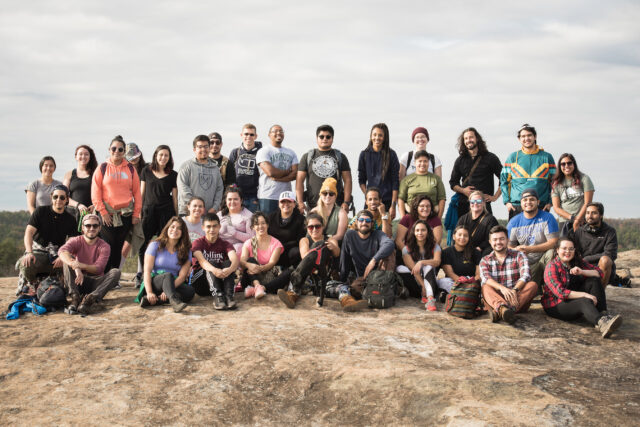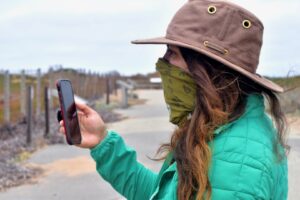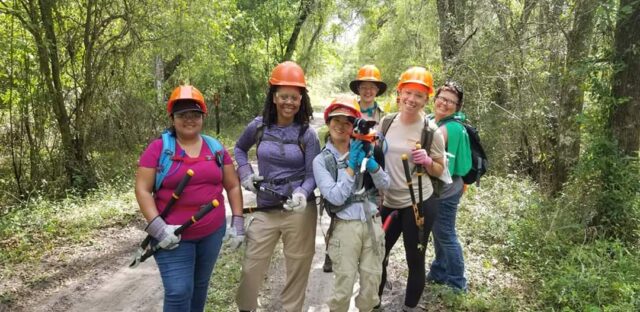The new normal
Changing outdoor representation and narratives
by Luz Lituma, Cofounder / Latinx Partnership Coordinator, Latinxhikers / Appalachian Trail Conservancy and Florida Trail Association

Photo Credit: Christian Restrepo. Luz Lituma (front row, second from left) leads a group hike in Arabia Mountain National Heritage Area for a Latinxhikers event.

Luz Lituma adapts to the times by wearing a mask and hosting a virtual hike during Latino Conservation Week. Photo Credit: Iris Rivas.
As cofounder of Latinxhikers, a community created to bring more diversity to trails, I am interested in addressing and changing the lack of diversity in outdoor recreation. Two major factors holding back progress are lack of access to public lands and lack of representation in the outdoor recreation industry. Julia Hartz, CEO of Eventbrite, once said, “If you can’t see it, you can’t be it,” when speaking of women role models in the media. You must be able to see others who look like you to feel inspired and empowered. Representation matters. Representation is crucial.
Latinxhikers began as an Instagram account where cofounder Adriana Garcia and I would share personal experiences of being out on the trails. We wanted to create a space where we could share our stories as two Latinx women and provide advice for other Latinxs to go outdoors. I wasn’t always what one would typically consider “outdoorsy.” I am a first-generation daughter of two immigrants from Ecuador. Leisure time and family vacations were few and far between for us. This meant our vacations were usually staycations and we’d do pig roasts at the lake or throw big outside parties with a lot of food. This was our way of being outdoorsy, and a lot of the Latinx community resonates with that version.
It wasn’t until 2016—after I unexpectedly summited Vinicunca, Rainbow Mountain in Peru, a 17,000-foot mountain—that I started hiking. I say unexpected because I honestly didn’t know what I was signing up for. The guide told us to “just wear comfortable shoes.” It was one of the hardest hikes I’ve ever done. After doing that, I felt like I could do anything. I switched up my way of travel and started visiting as many national parks as possible.
As the Latinxhikers community grew, so did our access to recreational opportunities. One of the best has been working with the Appalachian Trail Conservancy (ATC) and the Florida Trail Association (FTA) as a Latinx Partnership Coordinator. This position was created almost two years ago to bring more diversity to the outdoors and within environmental conservation organizations. My job is to create stewardship and volunteer opportunities for the Latinx community. But, my personal goal is to help people gain a greater appreciation for trails so we can establish a deeper connection to the lands and in return, create more lifelong stewards of these spaces.

A collaborative Florida Trail Association (FTA) volunteer work party with Girls Who Hike FL on the Florida National Scenic Trail in Green Swamp Wildlife Management Area. Photo Credit: FTA.
CREATING AFFINITY SPACES
Creating affinity spaces is critical when introducing the Latinx community to the trails. It helps our community feel safe and welcomed in places that have historically oppressed many people of color. During the COVID-19 pandemic, group gatherings—which is how we’ve engaged with outdoor spaces in the past—are out of the picture. With that in mind, I wanted to make sure people were still motivated to go outside and explore their own backyard. One way we’ve invited the community to participate was by hosting a virtual hike for Latino Conservation Week (LCW) in July. LCW was founded in 2014 by the Hispanic Access Foundation to encourage the Latinx community to access nature and build a connection to outdoor recreation and environmental stewardship. By engaging with the outdoors among a group with shared identities, one of LCW’s goals is to change the shape and narrative of outdoor recreation and dissolve the barriers which have kept the Latinx community from building a relationship with the outdoors.
By hosting a virtual hike during LCW, I encouraged people to get on a trail in their area and become aware of who maintains the trails they’re enjoying. I think there’s a common misconception that people get paid to do this work. Not many people know that the trails they recreate on are maintained by people like us—volunteers who help maintain and protect the paths which everyone can walk on. My hope was to inspire others to volunteer with the conservation organizations in their area—when it’s safe. The feedback and participation were tremendous. People did their homework by finding out who maintains their trails!
Here’s part of a post Kassandra Delgado, a fellow Latinxhiker from California, shared on her Instagram: “To be honest, I’m always so eager to lace up my hiking boots and add another summit to my hiking resume that I never stop to think about who is maintaining these trails. In honor of LCW, I decided to do some digging and found out that volunteers from The Mountaineers paint, repair, and clean the lookout year after year so that hikers like us can continue to visit.”
We had over 80 mini-groups all over the United States join and become informed. Not only did those individuals bring awareness to their small group, but they also posted about it on social media which spread the word to their networks, families, and friends as well.

Luz Lituma coordinated the first ever Latinx Trail Crew on the Appalachian Trail as a part of Latino Conservation Week in July 2019.
SHARING WOMEN’S STORIES
Another way we’ve been engaging our Appalachian Trail and Florida Trail lovers is by creating opportunities to share stories of amazing women on the trail. Wild East Women (WEW) is an affinity group created to help and encourage women to engage with the trail in meaningful ways. The group’s goal is to create future women adventurers, stewards, and leaders in the outdoor community. The group has been focused on hosting women’s workdays, while responding to COVID-19’s impact. Like the virtual hike for LWC, WEW hosted a women’s walkabout for National Public Lands Day that invited all to get out for a walk, stroll, or trek nearby in September. Participants were encouraged to incorporate a service component, if possible. A virtual happy hour was also planned to bring everyone together to share the stories of the day and connect the community despite our current social distances.
Sharing volunteer stories is a way to inspire other women to attend future events. Experiences shared by first-timers on volunteer trail crews, especially, show others that everyone is a beginner at one point. We’re also sharing stories through different mediums like podcasts. The WEW group is working with She Explores to develop a podcast series called Where We Walk. This six-part series highlights trails through both the women who helped to build them as well as those who continue to make it what it is today. The series will tell a multi-dimensional story through a range of voices from diverse backgrounds, hoping to engage a wider audience and encourage more folks to embark on their first volunteer journey.
There has been a greater appreciation for the outdoors during this pandemic. It is so inspiring to see people who previously had hardly ever gone outside now hit the trails and love it. With this new appreciation, we hope we can inform these newer hikers to join and to engage with organizations like the FTA and the ATC, and to learn their efforts and hard work. Continuing with our focus to enhance representation, we are in the process of developing a Storytelling Campfire Panel and a cooking series in honor of Hispanic Heritage Month (Sep. 15 – Oct. 15). We hope to inspire many new first-time volunteers in the near future. Even if we can’t be together, we’ll find ways to make it work.
When it comes to the outdoors, let’s work together to change the stories, the connections, and the perspectives of the great outdoors.
Representing Diverse Voices on the Trail
Latinxhikers (which began as an online platform in 2017) is a community dedicated to promoting diversity, equity, and inclusion in the outdoors through digital storytelling and community outreach.
Wild East Women is an affinity group working under the umbrella of the Appalachian Trail Conservancy (as an offshoot of the Wild East initiative) to support women in engaging with the trail in meaningful ways.
Editor’s Note: Luz Lituma was awarded a 2020 National Trail Intern Grant from the Partnership for the National Trails System to advance the work of the dual Latinx Partnership Coordinator role with the Appalachian Trail Conservancy and the Florida Trail Association. Learn more about this opportunity: www.pnts.org/new/intern-grants/
Unless otherwise indicated, all material in Pathways Across America is public domain. All views expressed herein are perspectives of individuals working on behalf of the National Trails System and do not necessarily represent the viewpoint of the Federal agencies.